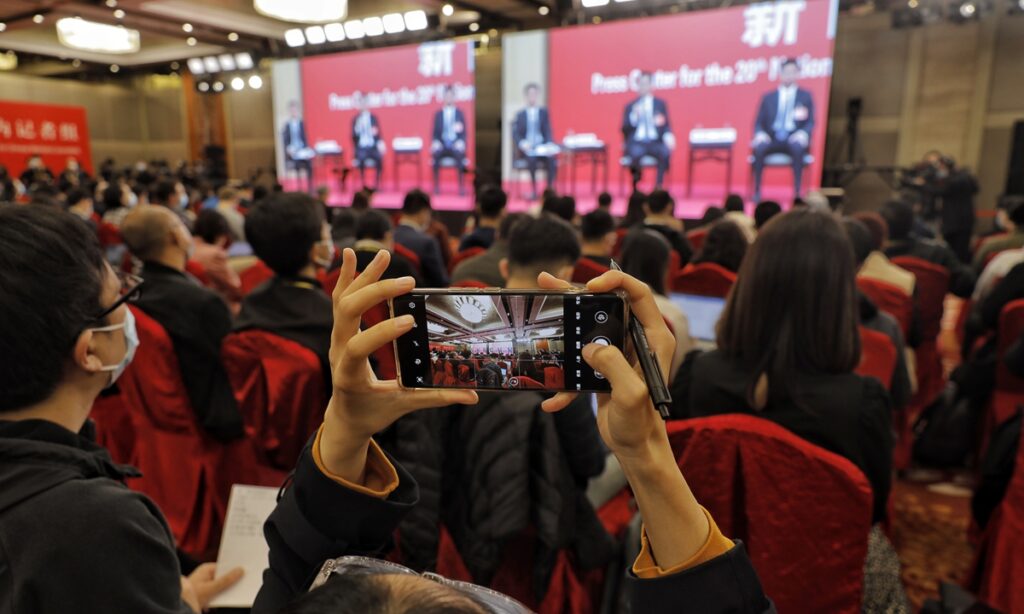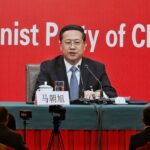China’s central bank on Thursday vowed to strengthen cross-cyclical and counter-cyclical fine-tuning to foster economic growth and stabilize employment and prices, among other financial efforts – revolving around development, security and opening-up – to be prioritized in alignment with Xi Jinping’s report to the 20th National Congress of the Communist Party of China (CPC).
The financial to-do list is set to navigate the economy through growing fears of global recession and strengthen its role as a stabilizer of the global financial landscape, experts said, hoping for increased financial soundness despite lingering global uncertainties.
China will uphold the principle of financial services serving the real economy and implement a prudent financial policy, Pan Gongsheng, vice governor of the People’s Bank of China (PBC), the country’s central bank, said during a group interview late Thursday hosted by the Press Center for the 20th CPC National Congress.
Pan pledged to strengthen cross-cyclical and counter-cyclical fine-tuning so as to create a good monetary and financial environment and guide financial resources to better support the key areas and weak links of economic and social development.
Dong Dengxin, director of the Finance and Securities Institute of the Wuhan University of Science and Technology, said that Pan’s emphasis on China strengthening cross-cycle and counter cycle is another illustration of its independent monetary policies.
China has carried out monetary policies in accordance with its own economic situation instead of blindly following other countries’ moves. For example, China has not followed the footsteps of the US in increasing interest rates, like many other countries did, but have instead lowered interest rate levels.
“Such moves show that PBC’s monetary policy regulation is independent and flexible. It’s a manifestation of Chinese financial regulators’ confidence and courage,” Dong told the Global Times on Thursday.
He also noted that China has ample monetary tools in its toolbox to carry out counter-cyclical regulation, including further interest rate cuts and increasing credit issuance.
China is one of the few major economies in the world that has adhered to the implementation of normalized monetary policy in recent years, Pan told reporters.
The stable monetary policy has created a good financial environment for stabilizing growth, commodity prices, employment and international balance of payment, he noted.
Looking back over the past decade, Pan said that the country’s financial structure has been significantly optimized, which strongly supports major national strategies such as poverty alleviation, small and micro enterprises, scientific and technological innovation, green development, rural revitalization and becoming a manufacturing powerhouse, as well as the key areas and weak links in domestic economic and social development.
Such efforts pit the country notably against the US, which has over the years relied on quantitative easing to revive its pandemic-inflicted economy before making a U-turn on monetary policy with drastic rate hikes, market observers said, blaming the US for roiling the global financial markets.
Meanwhile, Pan’s emphasis on strengthening financial risk prevention is seen as showing regulators’ resolve in safeguarding financial safety amid a growing call for national security.
The country will also adhere to coordinated development and security, and firmly grasp the bottom line of avoiding systemic financial risks. Preventing and dissolving financial risks is the eternal theme of the financial industry, the central bank official said.
China’s financial system will put financial risk prevention and control in a more prominent position, as well as improve the prevention, early warning and disposal mechanism of financial risks to maintain the country’s financial stability and security, he went on to say.
One important method for making this happen is keeping the fence of financial management system tight against potential risks, analysts said.
“I think China’s financial regulators will further improve financial regulations and laws, as well as direct financial institutions to improve their internal risk control mechanism to prevent cascading risks in the event of financial mismanagement, such as bank failures,” according to Dong.
The expert also noted that safeguarding financial security signals that regulators will make sure that domestic monetary policies are stable.
The central bank deputy governor also shone the spotlight on the CPC’s centralized and unified leadership over financial work, as he envisioned translating the institutional advantages of the Party’s leadership into more effective financial governance.
It’s important to make sure that the Party continues to chart the course for the financial industry’s development, as lucrative gains from the financial arena could carry huge moral risks in terms of management, Dong remarked.
“The Party’s leadership could steer the financial industry along a correct development track and keep the financial order stable. It could also make sure that finance serves the real economy,” he said, adding that Pan’s words could be read as a warning against capital’s unchecked expansion.
Speaking about a reliable push for high-level two-way financial opening, Pan stressed that the country has developed a multi-layered financial market, improved the financial regulatory regime and anchored the market toward being more market-oriented and law-abiding.
China’s banking sector now sits atop the global rankings by total assets. Its stock, bond and insurance markets are all second-largest in size terms globally, while its foreign exchange reserves have been the world’s largest for 17 years in a row.
The country has taken the global lead in green finance, inclusive finance and digital finance. Additionally, the yuan’s global clout has increased substantially, with its weighting in the IMF’s special drawing rights now at third largest. More than 80 economies have included the yuan in their reserve currencies.
(Global Times)




